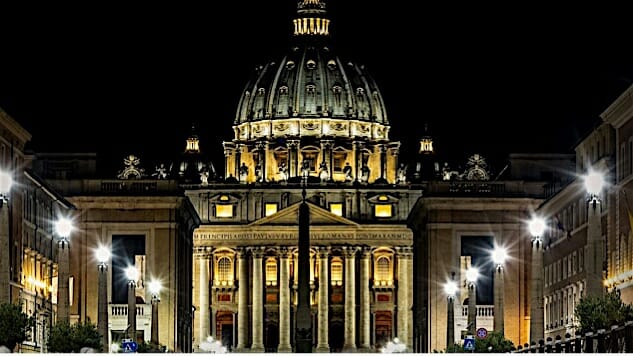The Vatican Deception

Documentaries encompass a pretty massive range of styles, approach to their subject matter, and objective. Some are highly journalistic. Some are artsy style-bombs where the subject matter almost takes a backseat to the execution. Often, they exist to educate us (thank you again, Sir David Attenborough). Sometimes they exist to pose a question more than to illuminate what we believe to be the answers. And sometimes, they exist to propagate an agenda or a polemic. In extreme cases, wherein certifiably false information is presented as fact we might call such documentaries propaganda. Sometimes polemical documentaries are sensationalistic, sometimes not (I still remember in the mid-nineties seeing a kooky doc about the Mayan calendar and the prophesied end of the world—December 27, 2012, by the way; I remember it to this day—that, even though I knew better, sent me to bed with a serious case of existential creepies. Sometimes agenda-ish documentaries are wildly convincing, sometimes not.
Sometimes you just don’t know what to make of something.
One hundred years ago, three children in Portugal claimed to receive a prophecy from the Virgin Mary. It interestingly coincided with some very weird celestial events seen by thousands and reported on extensively in 1917. The prophecy might have contained information about the demise of the Catholic Church and basically the entire world. But for some reason the Pope does not want you to know this. Why not? It’s a curious question, right? I mean, fictional Vatican conspiracies have been known to make certain writers and filmsters exceedingly popular and wealthy. Now there’s a documentary that seeks to expose a real one.
In Canada, a priest named Father Nicholas Gruner led, until his death a couple of years ago, a congregation of people devoted to something known as the Miracle of Fatima. If you’re Catholic or well-read you might already know about this. The Virgin Mary is purported to have appeared to three children in Fatima, Portugal, in 1917 and given them some “secrets.” The oldest of these children went on to become a nun. Sister Lucia ultimately wrote these secrets down. They had to do with the end of the world being brought about sometime after 1950 by corruption within the Vatican. There was luckily a way to stop it: The consecration of Russia.
Not a typo.
You might also know that this has never happened because the Popes of the mid-20th century had an agreement to stay the hell out of Russia to minimize risk of antagonizing the Communists.
The Vatican Conspiracy kinda sorta follows Gruner’s quest to get the Pope to release the complete communications of Sister Lucia, because the mic-drop portion about consecrating Russia is officially said not to exist. It kinda sorta follows a timeline of apparitions of the Virgin Mary. (There’s one in Ecuador in the 1600s and presumably plenty more that don’t get brought up.) Director Paul Stark’s film asks: Are there in fact unreleased documents whose contents are desperately important, which are being kept secret by the Vatican for some reason? And is the Fatima prophesy coming to pass even as we speak?
-

-

-

-

-

-

-

-

-

-

-

-

-

-

-

-

-

-

-

-

-

-

-

-

-

-

-

-

-

-

-

-

-

-

-

-

-

-

-

-








































